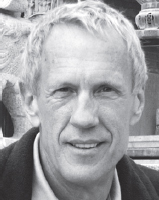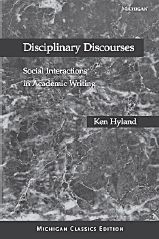Ken Hyland, Disciplinary Discourses: Social Interactions in Academic Writing

Disciplinary Discourses: Social Interactions in Academic Writing
KEN HYLAND

Hyland, Ken. Disciplinary Discourses: Social Interactions in Academic Writing. Ann Arbor: U of Michigan P, 2004. Print.
Framing the Reading

Ken Hyland is a linguist and currently Chair of Applied Linguistics and Head of the Centre for Applied English Studies at the University of Hong Kong (http://ww2.caes.hku.hk/kenhyland). In addition to the book from which the following reading is adapted, Hyland has written Second Language Writing (2003), Academic Discourse: English in a Global Context (2009), Metadiscourse: Exploring Interaction in Writing (2006), English for Academic Purposes: An Advanced Resource Book (2006), and Genre and Second Language Writing (2004), among others.
Rather than ask you to read a chapter from Ken Hyland’s book on citation in the university, we are including a brief summary of his claims. Hyland analyzes how academic texts are constructed. Hyland uses a research method called corpus analysis. This means that he uses a computer program to analyze thousands of texts and make conclusions about how various groups of people use language in very specific ways. In this summary we include some of his findings regarding how researchers in different disciplines cite their sources. If you’ve read this far in the book, you can guess why this information might be important. Understanding how professionals cite in your field can help you to more quickly learn to write appropriately in your classes.
Research is a social activity, it requires researchers to engage with their colleagues and it happens within social institutions. There are some features that all academic discourses share: acknowledging sources, rigorous testing, intellectual honesty, etc. But there are many ways that texts differ across disciplines, beyond obvious content differences. These differences are appropriate to the “academic tribe” that uses them. Each academic “discourse community” or “community of practice” has different goals, tools, and expertise. Their language demonstrates these goals, tools, and expertise.